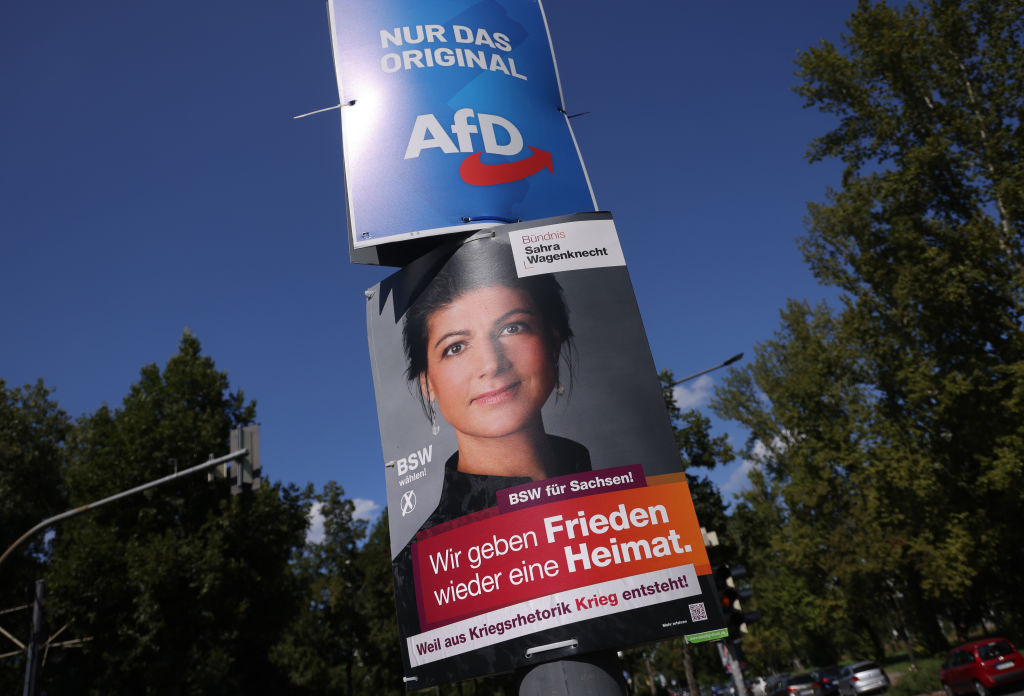This month, the former East-German states of Saxony, Thuringia and Brandenburg held elections for their state parliaments. Two parties that made the greatest gains were the far-right Alternative für Deutschland (AfD – Alternative for Germany) and the leftist Bündnis Sahra Wagenknecht (BSW – Sahra Wagenknecht Alliance). The results underscore the ongoing divide between what was once East and West Germany.
The largest political parties of the Christian Democratic Union (CDU) and Social-Democratic Party of Germany (SPD) still held sway, but the gains by the AfD and BSW are markers of a political shift that has unfolded over the past decade. Each has also begun to shape Germany’s domestic and foreign policy, which is likely to continue in the lead-up to the federal elections next year.
The two parties take a strong stance against Germany’s current immigration and climate policy with different justifications.
The AfD was established in 2013 as a Eurosceptic, centrist-conservative party, but it was only in 2015, when almost a million asylum seekers entered Germany, that it shifted to the far right and gained popularity, particularly in the Eastern states, for its anti-immigration, anti-Muslim, nationalist rhetoric. Since then, the AfD has established itself as a significant opposition party on both state and federal levels.
Despite only forming in January this year, BSW has quickly made a significant impression in German politics. Its namesake, Sahra Wagenknecht, is a well-known and polarising figure. She first gained notoriety as a prominent member of Die Linke, the successor to the ruling party of East Germany, having joined the latter as a 19-year-old shortly before the fall of the Berlin Wall. She left Die Linke late last year over her criticisms of identity politics, as well as her stance against strict climate policies, immigration and the war in Ukraine. Her politics is characterised by what she calls a “left conservatism” that embraces “traditions, stability and security” by restoring “common sense” to German politics.

The traditional parties have unequivocally ruled out forming coalitions with the AfD, however it will be impossible in all three of the so-called “new federal states” for any party to form a government without the participation of BSW. The AfD won the highest number of votes in Thuringia and the second-highest in Saxony and Brandenburg, while BSW received the third-highest number of votes in all three states.
Both AfD and BSW display a number of similarities that are concerning for international partners. Germany’s position as a major European power means its domestic political contest can threaten the efficacy of major multilateral bodies, including NATO and the European Union.
Both parties call for an end to emissions trading, the sanctions on Russian gas and the switch to renewable energies.
The parties have expressed opposition to NATO and Germany’s response to the war in Ukraine, calling for an end to the war through negotiations with Russian President Vladimir Putin. Earlier this year, the AfD and BSW were the only two parties who boycotted the address to the German parliament by Ukrainian President Volodymyr Zelenskyy. So similar are their stances, that far-right extremist and leader of the AfD in Thuringia Björn Höcke invited Sahra Wagenknecht to “come join us” prior to her leaving Die Linke party.
The two parties also take a strong stance against Germany’s current immigration and climate policy with different justifications. The AfD on ideological grounds, seeing high levels of immigration and the switch towards renewable energy as a threat to the German identity and the Folkist nationalist idea of “people and space”. The BSW however, offers a less extremist view, arguing current climate and immigration policies have eroded the welfare state and hindered economic equality. But both parties seem to come to the same position, calling for an end to emissions trading, the sanctions on Russian gas and the switch to renewable energies.
The AfD’s Eurosceptic origins still play a major role in its party position. Party leader Alice Weidel has promised a referendum on a German-exit should AfD come to power. While BSW also holds ambitions for entering the European Parliament, Wagenknecht, a former MEP herself, has expressed a desire for reform of the EU towards a union of sovereign democracies and stands against any expansion of the EU in its current form, including the integration of new countries such as Ukraine.
Already, AfD and BSW are having an effect on federal policy. Last week, Germany imposed expanded controls at its borders to France, Belgium, Luxembourg, the Netherlands and Denmark. The AfD criticised the controls for not going far enough. But the measures received criticism from Germany’s neighbours, Poland and Austria, and there are fears that such measures by one of Europe’s key powers will have implications for the free movement of people in the European Union.
Both parties leverage voter concerns over immigration, climate policy, war in Europe and the cost of living. Ahead of federal elections in Germany in a year from now, German Chancellor Olaf Scholz’s ruling coalition – already an awkward balance of diverse interests – will need to find a way to appeal to the Federal Republic as a whole.

